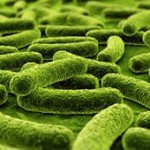What Are Prebiotics And Do You Need Them?
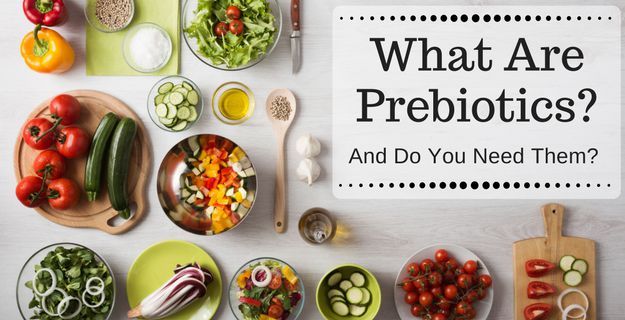
Just when you thought you got probiotics and friendly bacteria all figured out…in comes prebiotics.
I know what you’re thinking…goodness [gut] gracious…
Gut health is super confusing and intricate as it is.
And now we throw in stuff like prebiotics, FOS, inulin, microbiome, etc… Basically Greek.
And here I was all proud of myself for actually knowing what my doctor was talking about when she said I need a daily probiotic supplement.
So, we’ve got a lot going on.
That’s why we need to break it down into itty-bitty gut friendly pieces.
Because bite sized knowledge goes down much easier :)
And I promise you it won’t be complicated.
You just need to know the basics and what to look for in order to get your body on track.
Let’s figure out what the heck prebiotics are and why they’re so important.
Because if you didn’t know, prebiotics and probiotics go hand in hand.
They look almost identical but they serve very different purposes.
As you probably know, probiotics are the Holy Grail when it comes to achieving and maintaining proper digestive and immune health (and a laundry list of other amazing health benefits).
But think of probiotics and prebiotics as the miniature belly version of Batman and Robin.
Because what would Batman be without his trusty, noble steed?
One is good, two is great.
But it’s even more than that…
One doesn’t work as well without the other.
So, it’s a pretty pivotal role to say the least.
Now just sit back and relax while we dish out some simple essentials on everything you need to know about prebiotics.
What Are Prebiotics?
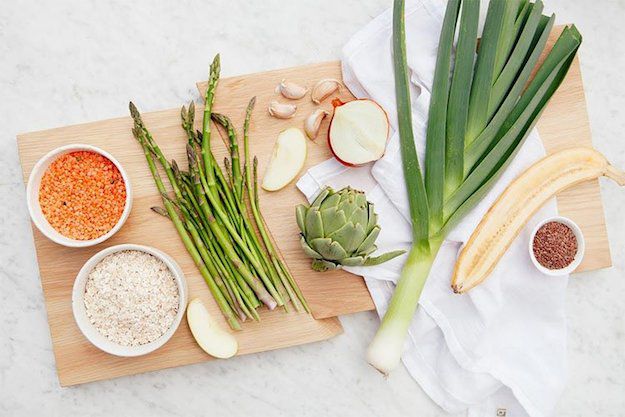
Image via The Health Science Journal
A great place to start in all this is figuring out what exactly these little buggers are.
They may seem foreign and new to us but they’re far from it.
Prebiotics are a non-digestible type of carbohydrate in the form of fiber that’s naturally found in various starches, fruits, and veggies.
Hmm… It’s a form of fiber?
I’m sure you’re pretty familiar with fiber but never associated your morning fiber-filled Raisin Bran with prebiotics.
Something to keep in mind is that all prebiotics are fibers, but not all fibers are prebiotics.
So how do these differ?
Well, to be considered a prebiotic fiber there needs to be a few special characteristics present.
First, they must be indigestible meaning they’re not digested or absorbed by the upper gastrointestinal tract.
Second, they make their way down the small intestine into the colon, where they’re fermented by the intestinal microflora (the fancy term for gut bacteria).
Third, the fermented prebiotics create byproducts that act as fuel to promote the growth of friendly bacteria in the gut.
Ok, we’re getting somewhere!
Next, let’s sort out how they work in conjunction with probiotics.
Probiotics & Prebiotics – The Dynamic Duo
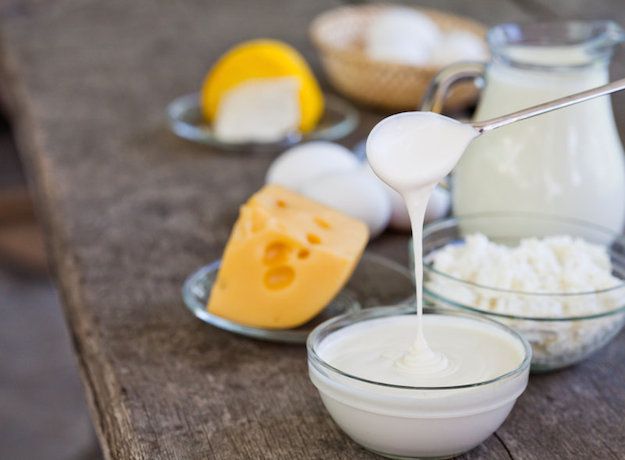
Image via Runtastic
We know prebiotics are special fiber that our bodies can’t digest and instead, they’re fermented and act as fertilizer for friendly bacteria.
The body is home to about 40 trillion bacteria – both good and bad kinds. That’s a pretty intense amount, right?
To give you a comparison, we have about 40 trillion human cells.
It’s estimated that the ratio between bacteria and human cells is about 1:1.
We’re essentially walking blobs of bacteria. How wonderful!
And if you’re savvy with gut health, you know that probiotics are bacteria…the friendly kind.
Seeing the connection, yet?
Here’s a quick comparison:
Probiotics: Living, friendly bacteria that reside in our digestive tracts and promote overall digestion, immune function, and an endless list of health benefits.
Prebiotics: A non-digestible, non-living special form of dietary fiber for the probiotics or friendly bacteria to “eat”.
Probiotics are incredibly diverse, powerful, and plentiful living microorganisms that replenish friendly bacteria and have nothing short of miraculous positive effects.
They’re collectively a friendly bacteria filled Batman… fighting for justice and order among the harmful microbes residing in Gut Gotham.
But there’s one problem…
Probiotics are living organisms and must be kept alive to do any good.
If Batman had a kryptonite…this would be it!
Because millions or billions of friendly bacteria are wonderful but if they’re dead… they’re useless at combating microbial crime for us.
So, the trickiest part of probiotics is keeping them alive.
These delicate little critters are potent but easily killed off by harsh stomach acid, heat, or simply time.
That’s why delivery systems are really important when it comes to probiotic supplements.
But what else can help out our friendly little friends?
You guessed it – Prebiotics, (aka Robin) the precious partner in the crime-fighting dynamic duo!
This indigestible fiber isn’t destroyed by the body and can resist cold, heat, acid, and time.
It also acts as fertilizer or food for the good bacteria or probiotics.
Tada! Prebiotics help feed and nourish the good bacteria in the gut.
They also keep the bad bacteria at bay.
This is a great thing!
So, not only do these specialized fibers safeguard and feed friendly bacteria, but they also benefit the body in countless other ways.
Let’s keep reading to see how these fibers are beneficial for the entire body.
The Remarkable Benefits Of Prebiotics
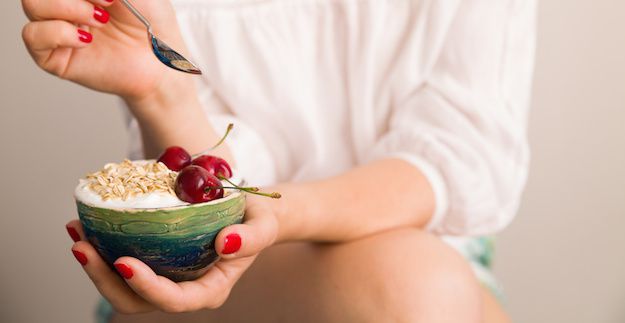
Image via Naturally Savvy
Nowadays there’s tremendous focus on the benefits of probiotics, as there should be, but prebiotics can hold their own as equally mighty health boosters.
Both prebiotics and probiotics are needed because each greatly benefits your microbiome (aka the population of trillions of bacteria that dwell in the body).
They work synergistically to promote optimal health and foster overall wellness.
Research studies show those with an increased intake of prebiotics experience benefits such as:
- Properly functioning digestive system
- Improved gut health
- Less chance of developing heart disease
- Healthy cholesterol levels
- Lessened stress levels
- Increased immune response
- Lower chance of weight gain and obesity
- Balanced hormones
- Decrease in inflammation and autoimmune reactions
As you can see, they help in all areas, not just gastrointestinal matters.
Here’s a breakdown of the 7 biggest benefits of these special fibers.
1. Improve Digestion
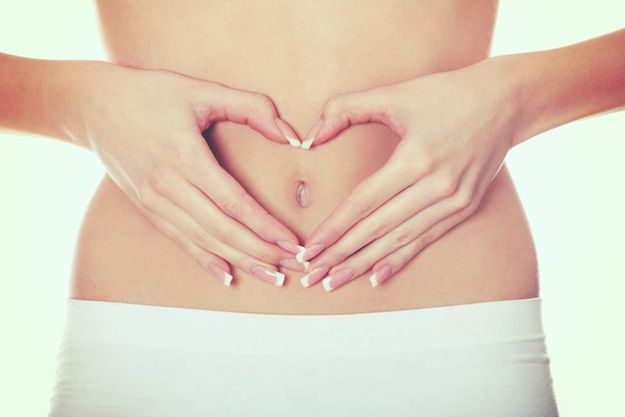
Image via Paleo Hacks
Do you have trouble with digestion? Whether it’s occasionally or frequently…it’s never fun when things are off track.
It’s one of those things we totally take for granted when it’s working optimally.
To keep everything moving and working smooth, it’s vital to get plenty of prebiotics.
These fermentable carbohydrates drastically increase the amount of beneficial bacteria in your belly.
As we mentioned earlier, they’re like a fertilizer for probiotics – the good guys!
This boost in friendly microbes helps us break down and absorb nutrients in our food.
It’s a secret weapon for fending off common digestive upsets like constipation, gas, diarrhea, and belly bloat.
The Journal of Nutrition published a study in 2012 that explains prebiotics also help treat:
- Intestinal infections and chronic disorders (such as ulcerative colitis and Crohn’s disease)
- Antibiotic related diarrhea
- Leaky gut syndrome
- Irritable Bowel Syndrome (IBS) symptoms
- Candidiasis (Candida virus – caused by a fungal infection and yeast)
- Inflammatory bowel disease
2. Supercharge Your Immune Function
We know how crucial our immune system is to our health.
That’s why we want to do everything we can to keep it running in tiptop shape!
Luckily, it’s as easy as getting enough prebiotic fiber into your diet.
They boost our immunity by supporting flawless absorption of trace minerals and nutrients from our diet.
Consumption of these specialized plant fibers also lower the gut’s pH levels.
Lower pH knocks out harmful bacteria and prevents pathogens from growing.
Another key ingredient for fantastic immunity is a strong intestinal barrier.
These indigestible carbs feed bacteria that nourish the intestinal cells.
When these cells are nurtured, they create a strong barrier.
This prevents any gaps from forming that allow bad bacteria and nasty toxins into the bloodstream.
The British Journal of Nutrition says that prebiotics improve overall health, lower chances of infections and gastroenteritis, regulate stool consistency and frequency, and decreases seasonal allergies.
It also helps treat and prevent urinary tract infections (UTIs), yeast infections, and the flu and colds.
3. Chill Out And Alleviate Anxiety And Stress

Image via Reader’s Digest
One of my favorite things I said as a kid was “take a chill pill!”
I always got a kick out of it and thought I was oh so clever (gosh, I could’ve used some better content as a kid).
Little did I know, I would (quite literally) need to take my own advice as an adult.
A chill pill seems nothing more than a silly joke.
But could one actually exist?
Prebiotics might just be the golden ticket or pill we need!
The gut-brain connection is incredibly intricate and interwoven.
What’s happening in our guts directly impacts our brain function and vitality.
Research shows prebiotics impact how we feel by creating and controlling serotonin, one of the happiness hormones in our brain.
More than that, these fancy little fibers lower stress-related hormones.
In a true chill pill fashion – they produce anti-anxiety and antidepressant effects in the body.
So not only do they help foster good feelings, they also negate negative ones.
That’s what we call a win-win! :)
4. Your Personal Fat Buster

If you didn’t love prebiotics already, here’s another reason to adore them…they can help you lose weight!
The British Journal of Medicine and the American Journal of Clinical Nutrition both published studies that prebiotics stave off hunger by increasing satiety hormones.
They control appetite and naturally make you feel less hungry.
Other studies show that these indigestible carbohydrates help reduce body fat.
Higher amounts of all fiber, including prebiotic fiber, are associated with reduced body weight and lower chances of obesity.
5. Promotes Healthy Bones

We’re continuing to uncover the fantastic benefits prebiotics offer us.
The Journal of Nutrition, along with other journals, published studies showing prebiotics promote strong bones, keep osteoporosis at bay, and prevent fractures.
These unique carbs do wonders at increasing our mineral absorption in the body.
Things such as calcium, iron, and magnesium, which are crucial for bone health.
It’s been reported that just 8 grams of prebiotics per day made significant improvement in the uptake of calcium and fosters a surge in bone density.
6. Reduces Inflammation And Diseases

We hear the term inflammation quite a bit and I think we forget how big of a deal it is.
Because how bad could inflammation really be?
It seems irritating more than anything.
Well, it has been deemed as one of the root causes of all diseases.
This includes our nation’s number one killer… heart disease.
Yikes!
Now that we have your attention…
There’s a natural solution for this massive problem.
Studies show that diets high in fiber, including prebiotic fiber, are less likely to develop cardiovascular diseases and inflammation.
It also lowers inflammation around your arteries, thus promoting higher blood flow and oxygen throughout your veins and into your organs.
Another benefit of these un-digestible plant fibers is they reduce glycation.
Glycation is responsible for triggering inflammation, increasing harmful free radicals, and lowering insulin resistance.
These specialized plant fibers balance electrolyte levels, especially sodium and potassium, which are pivotal for controlling high blood pressure. (Another issue that many of us experience).
Poor gut health is also associated with a ton of different ailments, both big and small.
To supercharge your gut, you need the dynamic duo – probiotics and prebiotics.
Both of these go in and kick inflammation’s butt and fight off inflammation-related diseases like type 2 diabetes, arthritis, high blood pressure and cholesterol, and obesity.
7. Hormone Regulation And Mood Enhancement

Hormones are another area that plays a massive role in our health.
Women know how powerful these chemicals are on our bodies…and men have probably noticed, too, by direct observation or as innocent bystander.
Regardless, hormones are incredibly important and there’s a delicate balance that keeps us on this side of crazy.
Studies suggest that hormonal balance and your mood are directly influenced by a number of factors, one of those heavy contributions being bacteria levels based on current gut health.
You need a healthy gut to absorb and metabolize nutrients that eventually support the hormone producing functions of neurotransmitters.
When neurotransmitters misfire, we’re left in a heap of trouble both mentally and emotionally.
Recent studies show that prebiotic fibers have great neurobiological benefits in the human brain, like increasing serotonin, reducing cortisol amounts, and stabilizing our stress responses.
This special fiber may help normalize emotional and mental health, sharpen brain function, and help cope with stress.
Regularly consuming prebiotic foods also promotes restful sleep because they increase REM sleep, especially after experiencing a stressful situation.
Who Needs Probiotics?
We figured out what prebiotics are, how they work together with probiotics, and their seemingly endless health benefits.
Which leads us to our next question… Who needs them?
Or more importantly, do you need them?
The resounding answer to both of those questions is… YES!
Literally everyone needs prebiotics.
It doesn’t matter if you’re young or old, big or small, or male or female.
Everybody needs them and can greatly benefit from them.
This is especially true if you’re struggling with digestive disorders, tummy troubles, poor immune function, high-stress levels, weight-loss issues, and out of whack hormones.
However, there are a few people who may need to be a little cautious.
People with IBS, SIBO, or FODMAPs intolerance, sometimes notice that this particular fiber aggravates their symptoms.
On the other hand, some research shows that prebiotics help treat and prevent those exact conditions.
So it’s up for debate and you just have to listen to your body.
If you don’t suffer from any of those, you’re free and clear to enjoy the benefits of these plant fibers.
The beauty of these indigestible foods is that they are just that… food!
They’re natural, safe, and effective.
Our diets are the key to a healthy body.
Proper nutrients nourish our body and treat ailments at the source.
This is drastically different than the common approach of dumping a bunch of medications and chemicals into your body, hoping they soothe the symptoms (but not doing much to fix the underlying problem).
Extensive research has been done on all walks of life in relation to the advantages you get from including prebiotics into your diet.
Studies include the positive effects seen in young children and elderly individuals and everywhere in between.
It gives you the peace of mind that you can really make a difference with a simple addition to your diet.
Which leads us to our final segment, how do you get them?
How To Get Prebiotics In Your Diet
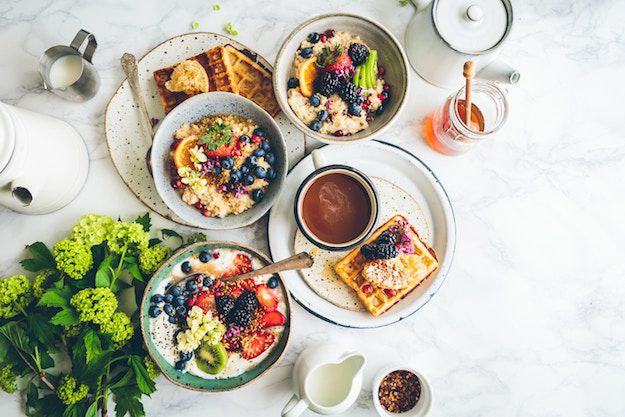
Now that you’re officially a die-hard fan of prebiotics, it’s time to figure out how in the world to get them into your diet.
Luckily, there’re 2 fantastically easy ways to get your daily dose.
The first way is by eating prebiotic foods.
What are those, you ask?
This article will give you the down low on the best prebiotic foods that you should be eating.
The second way is with prebiotic fiber supplements.
These supplements can be in a powder or capsule form and contain prebiotic fiber.
It’s also really convenient and beneficial if you have a quality probiotic supplement that includes FOS or Inulin (both types prebiotics).
You can do a mixture of foods and supplements to make sure you’re getting an adequate amount, which ranges from 4 – 15+ grams per day.
In Conclusion…
Prebiotics are indigestible plant fibers that work to fertilize friendly bacteria, diversify and improve our microbiome, and boost overall health.
Their list of benefits is vast and it will continue to grow as research uncovers all of their mighty powers.
So if you aren’t already, it’s time to get these good guys in your system!
What are you waiting for?
Do yourself a favor and get some prebiotics stat, your whole body will thank you!







